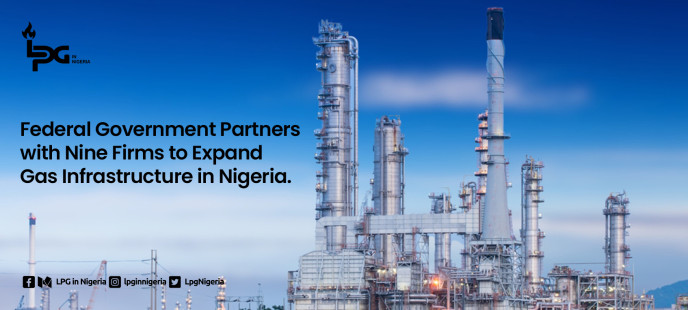- 3658
- 4
Sharing Ideas and Updates on LPG in Nigeria and related information to enable effective collaboration within the LPG Value Chain
Federal Government Partners With Nine Firms To Expand Gas Infrastructure In Nigeria

In a bold move to deepen Nigeria’s energy transition and infrastructure development, the Federal Government, through the Midstream and Downstream Gas Infrastructure Fund (MDGIF), has signed joint venture investment agreements with nine private companies. This landmark partnership signals a major step forward in realising President Bola Ahmed Tinubu’s “Decade of Gas” agenda.
The agreements, signed in Abuja, aim to boost Nigeria’s gas infrastructure with ten critical projects covering gas processing, Compressed Natural Gas (CNG) distribution, and Liquefied Petroleum Gas (LPG) storage. The beneficiary companies include ANT Energy Ltd, Sub Sea Gas, Wishnefisky Global, Waterdance International Concepts, Geospectra Energy, Deemah Integrated Services, Sonic Petroleum, VTT LNG West Africa, and Amari Energy Resources.
According to Oluwole Adama, Executive Director of MDGIF, the joint venture covers six new gas processing plants—two of which will convert flare gas into usable fuel—thus directly supporting Nigeria’s efforts to reduce harmful gas flaring. In addition, three CNG refuelling stations and one bulk LPG storage facility are in the pipeline to address bottlenecks in supply and improve gas access for transportation, domestic use, and industrial applications.
Adama highlighted that ongoing reforms within the petroleum sector, particularly those ushered in by the Petroleum Industry Act (PIA), have successfully attracted fresh investments, encouraged local refining, and unlocked new opportunities to monetise Nigeria’s vast natural gas reserves.
Minister of State for Petroleum Resources (Gas), Ekperikpe Ekpo, described the agreement signing as a watershed moment in Nigeria’s energy history. He emphasised that the Tinubu administration remains unwavering in its commitment to energy security, economic expansion, and environmental sustainability.
“The future of Nigeria’s gas economy will not be judged by the documents we sign but by the results we deliver—pipelines laid, facilities commissioned, jobs created, and energy supplied to millions,” Ekpo said.
Supporting Clean and Affordable Transport with Project CNG-Sprout
The government’s gas infrastructure push also extends to the transportation sector. At the launch of “Project CNG-Sprout” in Abuja, Minister Ekpo reiterated the country’s push for CNG adoption, particularly in public and university transportation. The initiative introduces CNG-powered buses to Nigerian universities as part of a wider palliative strategy to alleviate transportation costs for students.
The project, funded by MDGIF and executed in partnership with FEMADEC Energy, aligns with Nigeria’s drive to promote affordable, clean energy. According to Ekpo, CNG vehicles offer an environmentally responsible and economically viable alternative to petrol and diesel, helping to reduce the nation’s carbon footprint while driving down transport costs.
“This initiative supports President Tinubu’s Renewed Hope Agenda by ensuring access to affordable energy and sustainable development for all Nigerians—especially vulnerable communities,” he noted.
A Strategic Push Toward a Gas-Powered Nigeria
The signed projects mark a significant milestone in bridging the gaps within Nigeria’s gas value chain—from production and processing to distribution and end-use. By laying the foundation for a functional and resilient midstream and downstream gas infrastructure, the Federal Government is enabling access to cleaner energy sources, stimulating job creation, and supporting industrial growth.
At LPG in Nigeria, we commend this proactive approach and encourage stakeholders across the gas value chain to leverage this momentum. As Nigeria accelerates toward a gas-powered future, collaboration, innovation, and timely execution will be key to ensuring that the promises of the “Decade of Gas” become a reality for millions.
Source: The Guardian.
4 Comments.
-
-
Oniwona sylvester
06 June 2025 - 07:30amWe may never get things right in our drive to become developed' or be among deveped nations ' my first observation is that when it has to do with government funding projects ' novices gets more ? New companies and old ones without track records takes the stage' Theories and well packaged documents to present shouldn't be the criteria' 1) Are they one ground in the field not in the office ? 2) What have they done (competence)that can be verified before they get enlisted for this ? We are good in policy formulations no doubt but between the policy makers ' the drivers of the policies and those the policies are supposed to benefits ' we have a lot of lapses' We can only pray and hope things change one day
Reply-

Oluwabukola Jimoh
11 June 2025 - 07:09amInsightful and an angle that is not usually explored!
Reply
















Opene augustine oputa
10 June 2025 - 07:02amFuel gas repair kit
Reply